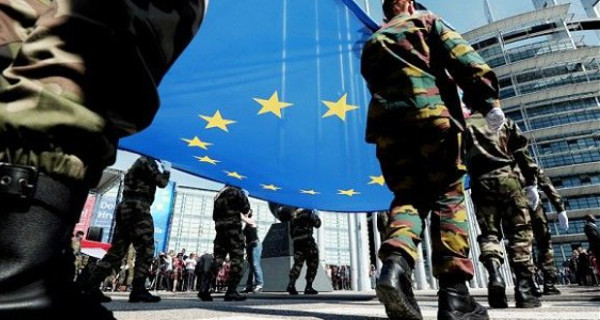
In a historic move 25 European Countries excluding Malta and Denmark have signed the Permanent Structured Cooperation (PESCO) pact, a permanent military cooperation based structure aiming for the self reliance in the military matters. The signing establishes the fact that EU is itself geared towards developing its own military capacity. Earlier the 23 EU member states had signed the Joint Notification on the PESCO in the second week of the November which was the first formal step to establish the structure.
The Joint statement had underlined the objectives of the PESCO which stated that “PESCO is an ambitious, binding and inclusive European legal framework for investments in the security and defence of the EU’s territory and its citizens;the list of “ambitious and more binding common commitments” the member states have agreed to undertake, including “regularly increasing defence budgets in real terms in order to reach agreed objectives; proposals on PESCO governance, with an overarching level maintaining the coherence and the ambition of the PESCO, complemented by specific governance procedures at projects level.’’ (Press release, Council of the Europe,13/11/2017)
The PESCO originates from the Lisbon Treaty where it is spelt out that efforts for such structure be made in order ‘to strengthen their cooperation in military matters by creating permanent structured cooperation (Articles 42(6) and 46 of the Treaty on European Union (TEU)).’ For this purpose the member countries were to fulfill two conditions- they had to develop their defence capabilities with the development of national contributions and to participate in the multinational forces.
European Union was in active mood on the issue since a long time and now they have come to establish such a military structure in European Union. Great Britain which has recently moved forward with EU on Brexit with reservations is not a part of it due to its decision to leave the Supranational Organization.
The move is a direction which EU wants to take in the coming years. It wants to have its own military identity which is blurred due to over domination of USA in NATO. European Union knows that NATO is extension of cold war age institution with which US wants to serve its own interests. In case in future if Europe comes into conflict with the US on any point what will be the strength at its disposal? Hence EU is futuristic with this structure.
NATO provides guarantee to European states but they are also aware that often the NATO is used to fulfill the US national interests which they may not like to be a party but are forced for the same. The independence in the military affairs have been lost by the European countries which they had visualized since the Lisbon Treaty days hence they conceptualized the idea of militarization and now they have moved closer for this aim.
EU members are also fearful of the Russia. They think that Russia is a threat to their existence. They view Ukraine crisis as its substantial example. They therefore are keen to enhance their military capabilities. This is related to the psyche of militarization which has come to dominate the world in recent time.
These factors make the EU logic to move towards a permanent structure for the military power enhancement.
Militarization in the world is on rise. Even smaller countries want to possess the most advanced weapons. Saudi Arabia lives in this state of mind. North Korea has moved beyond the normal limits of militarization- supportive nations as China allowed it to move towards nuclear militarization path.
Japan is fearful of the developments in its periphery hence it has considered a walk on path of military power strengthening. Middle East is a conflict cube where several EU nations have their own stakes as terrorist attacks emerge from this zone to Europe. UK is arms seller and is fearful of penetration of terrorist ideology in some of its people.
The reasons are multiples for the increase in militarization psyche among the nation states but this is a truth as well that world is moving towards a zone of persistent conflict where war possibilities are being strengthened by moves like PESCO. SIPRI, Stockholm in its statement in April, 2017 had stated that ‘spending continued to grow in Asia and Oceania, Central and Eastern Europe and North Africa’ explicitly suggesting that European countries were more focused to acquire the weapons. This trend has now been matured with the signing of the PESCO Agreement among most of the EU members.
It is expected that in near future some non EU members as Turkey may exhibit their willingness to be a part of the PESCO as it is tempting to these countries to gain the legitimacy of their regime and to strengthen their military capability.
The impacts of PESCO are multi fold in the near future. How does it evolve will decide its strength. One result is well decided that it will give a military identity to European Union but equally important is that it will enhance a new wave of militarization in the world. There is need to dismantle NATO but that is yet to be given a thought by its operators and now a new military structure is matured for operationalisation. This is a tragedy of the contemporary global politics.
Dr. Vivek Kumar Srivastava, Vice Chairman, CSSP, Kanpur; e mail: [email protected]








































